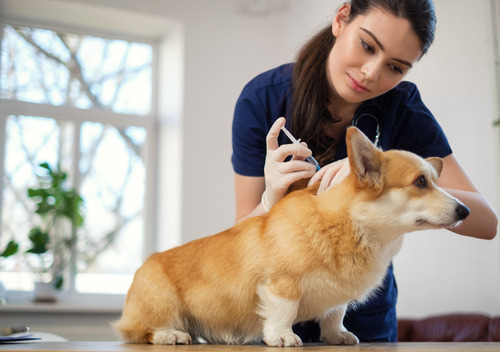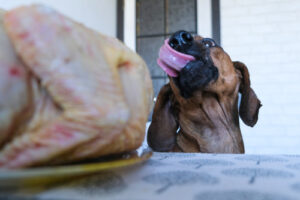Dog vaccinations play an essential role in protecting your pet from serious and sometimes life-threatening diseases. A proper dog vaccination schedule helps ensure your canine companion builds strong immunity early and maintains it throughout their life. By following your veterinarian’s recommended schedule, you can safeguard your dog from preventable illnesses and support their long-term health.
At Chino Valley Animal Hospital, our team provides personalized vaccination plans based on your dog’s age, lifestyle, and environment. Understanding which vaccines your dog needs and when is key to giving them the best protection possible.
Why a Dog Vaccinations Schedule Matters
A well-timed dog vaccinations schedule ensures that each vaccine is given at the right age and interval for maximum effectiveness. Puppies, in particular, are vulnerable because their immune systems are still developing. As maternal antibodies fade, timely vaccinations step in to fill that gap in protection.
Vaccinations not only protect individual pets but also help reduce the spread of contagious diseases within the community. Diseases like parvovirus, distemper, and rabies can spread quickly among unvaccinated dogs, leading to serious outbreaks. By staying on schedule, pet owners help maintain what veterinarians call “herd immunity,” which keeps the overall pet population safer.
Understanding Core and Non-Core Vaccines
Your dog’s vaccinations schedule typically includes two main types of vaccines: core and non-core. Each category serves an important purpose in protecting your pet.
Core Vaccines
Core vaccines are recommended for all dogs, regardless of age, breed, or environment. These vaccines protect against the most common and severe diseases:
- Rabies: Required by law in most states, rabies vaccination protects against a fatal virus that can affect both animals and humans.
- Distemper: This highly contagious viral disease affects the respiratory, gastrointestinal, and nervous systems.
- Parvovirus: Known for causing severe vomiting and diarrhea, parvovirus can be deadly, especially for unvaccinated puppies.
- Adenovirus (Canine Hepatitis): This vaccine protects against liver infection and helps prevent respiratory issues.
Non-Core Vaccines
Non-core vaccines are recommended based on your dog’s exposure risk and lifestyle. During your visit to Chino Valley Animal Hospital, our team will help determine which vaccines make sense for your pet. Common non-core options include:
- Bordetella (Kennel Cough): Recommended for dogs that attend daycare, boarding, or grooming facilities.
- Leptospirosis: Protects against bacteria found in standing water and wildlife urine.
- Lyme Disease: Important for dogs living in or visiting tick-prone areas.
- Canine Influenza: Suggested for social dogs frequently around others at parks, events, or boarding centers.
Dog Vaccinations Schedule by Age
Dog vaccinations at Chino Valley Animal Hospital are structured to provide the right protection at the right time. The following timeline offers a general guideline for how vaccines are typically administered.
Puppy Vaccinations (6–16 Weeks Old)
Puppies require a series of vaccines to build immunity as maternal antibodies wear off.
- 6–8 weeks: First doses of DHPP (Distemper, Hepatitis, Parvovirus, Parainfluenza)
- 10–12 weeks: Second DHPP booster; Bordetella or Leptospirosis may be added if appropriate
- 14–16 weeks: Final DHPP booster and the first Rabies vaccine
Adolescent Dogs (6–12 Months Old)
Your dog will need additional boosters to maintain immunity. Most receive:
- Rabies booster (if required by local law)
- DHPP booster
- Optional non-core vaccines (e.g., Lyme, Leptospirosis, or Bordetella based on lifestyle)
Adult Dogs (1 Year and Older)
After your dog completes the puppy series, most vaccines shift to an annual or triennial schedule.
- DHPP: Every 1–3 years
- Rabies: Every 1–3 years (depending on vaccine type and state law)
- Non-core vaccines: Annually, if recommended by your veterinarian
Regular checkups help ensure your dog’s vaccinations schedule stays current and that boosters are given before immunity fades.
Factors That Can Affect Your Dog’s Vaccination Schedule
Not every dog vaccination schedule looks the same. Several factors influence your dog’s vaccination needs and timing.
1. Age and Health Status
Puppies and senior dogs often require different vaccination intervals. Dogs with certain health conditions or immune disorders may also need adjusted schedules.
2. Lifestyle and Environment
Active dogs who visit parks, groomers, or boarding facilities may need additional vaccines for protection against contagious diseases. Similarly, dogs in rural or outdoor environments might need protection against leptospirosis or Lyme disease.
3. Local Regulations
Arizona state law requires dogs to be vaccinated against rabies, but other vaccine requirements can vary by county or facility. Boarding facilities, for example, may have their own vaccination requirements before allowing your dog to stay.
4. Vaccine Type
Some vaccines provide longer-lasting protection than others. While rabies and DHPP vaccines may last up to three years, others, like Bordetella or leptospirosis, often require annual boosters to remain effective. Your veterinarian will guide you through these details and adjust your dog vaccinations schedule as needed.
Potential Side Effects of Vaccines
Most dogs handle vaccinations very well. Mild side effects, if any, are usually short-lived and can include:
- Slight swelling at the injection site
- Temporary tiredness or reduced appetite
- Mild soreness or sensitivity
These are normal immune responses as your dog’s body builds protection. Severe reactions are extremely rare but should be reported to your veterinarian right away if you notice persistent vomiting, hives, or difficulty breathing. Your veterinary team at Chino Valley Animal Hospital will always discuss what to expect after vaccination and how to make your dog comfortable afterward.
How to Stay on Track with Vaccines
A consistent dog vaccination schedule can feel like a lot to manage, but with a few organizational habits, it becomes much easier to stay current.
Keep a Vaccination Record
Maintain a physical or digital record of each vaccination, including the date, type, and next due date. This record is especially useful for boarding, grooming, and travel.
Schedule Reminders
Set reminders on your phone or calendar for upcoming vaccines and annual wellness visits. Many veterinary practices, including Chino Valley Animal Hospital, send automated reminders by email or text to help pet owners stay on track.
Book Annual Exams
Vaccination appointments are a perfect opportunity for your veterinarian to conduct a full physical exam and assess your dog’s overall health.
Partnering with Your Veterinarian for a Healthy Future
Following a dog vaccination schedule is one of the simplest ways to protect your dog’s long-term health. Vaccines guard against painful, contagious, and potentially fatal diseases that can spread rapidly among unprotected pets. When you partner with your veterinarian to stay up to date, you give your pet the best chance at a healthy, active life.
At Chino Valley Animal Hospital, we tailor each dog vaccination schedule to fit your dog’s age, health, and lifestyle. Call (928) 636-4382 or book an appointment online today to review your dog’s vaccines and keep their protection current.




